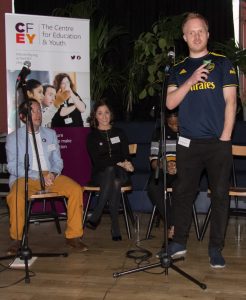The community groups, activists and politicians who give me hope: Luke Billingham
14th October 2019
Luke Billingham is a youth and community worker at Hackney Quest, a long-running youth and community centre in Hackney, where he is involved with mentoring, exclusion prevention, youth voice and community development projects. Luke is also Head of Strategy at Reach Children’s Hub, an innovative new charity providing cradle-to-career support for children and young people in Feltham, South-West London, and is a trustee of Haven Distribution, the books-to-prisoners charity.

The places and people that give me hope are those that provide the best conditions for individuals and communities to achieve mental, social and material wellbeing.
Youth and community centres nationwide (those that we still have) provide a second home and a shedload of love. Our best schools are not only committed to fostering their students’ passion for learning, but they also provide a warm, inclusive environment, informed by a rich understanding of attachment, relationship-building and trauma. This is all paired with a gargantuan quantity of mutual respect.
There are individual professionals in our schools, hospitals, charities, prisons, social care systems, and mental health services who beautifully transform people’s sense of themselves, and genuinely reorient their lives. These can be places where people are not afraid to talk about love and hope, and mention them far more than referral forms and risk.
The community groups, activists and politicians who give me hope: Luke Billingham Share on XThe Wellbeing Centre in Pentonville Prison is the most striking example of this that I have seen; providing warmth and care within the harshest possible context. Places like these are all the more valuable at a time when far too many services and institutions are either closing down, or have become so punitive and transactional that they serve to diminish and belittle rather than support and encourage.
I am also given hope by the community groups, activists and politicians who are fighting for deep, broad-ranging structural changes. These structural changes are necessary if we are to rectify the grotesque inequality, poverty and marginalisation that blights our society.
“Structural changes are necessary if we are to rectify the grotesque inequality, poverty and marginalisation that blights our society.” says @lbilli91 #DecadeInMaking Share on XAs we step into the next decade, we need more places to nurture our most vulnerable young people, and more radical change to reduce the hardship and demoralisation that are at the root of most social problems. The former without the latter would just be sticking plasters on a gaping wound; the latter without the former would be a cold kind of revolution.
Alongside this, we need to avoid falling into the trap of fads. Unfortunately these are infecting the world of community work and charities. Much like fads such as ‘flipped learning’ rarely had the desired effect in schools, in the community sector we are now finding that innovative, important ideas are becoming bastardised, to the point that they are devoid of meaning. At worst, ideas that aim to empower have the opposite effect in practice. ‘Co-production’ can mean cajoling ‘service-users’ and stealing their ideas for free. ‘Systems change’ can mean hours of chat with a lot of post-it notes and very little insight, and ‘recognising the value of lived experience’ can result in young people being asked to re-live their trauma on stage for a privileged audience, again, for free.
The point is not that we need fewer good ideas, or that they should never become too popular, but that the precision and rigour of our thinking and our self-reflection should increase in tandem with the power and influence of the concepts we’re wielding.
'We need to implement new ideas in meaningful, rigorous, and authentic ways - grounding them in front-line experience and professional expertise' says @lbilli91 #DecadeInMaking Share on X



Comments